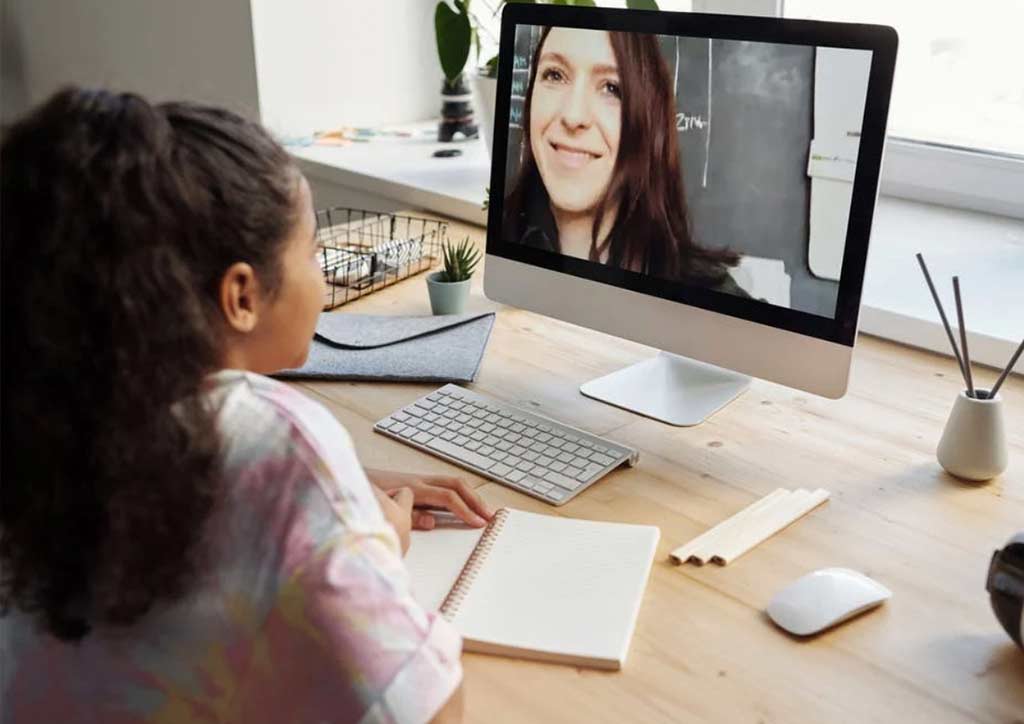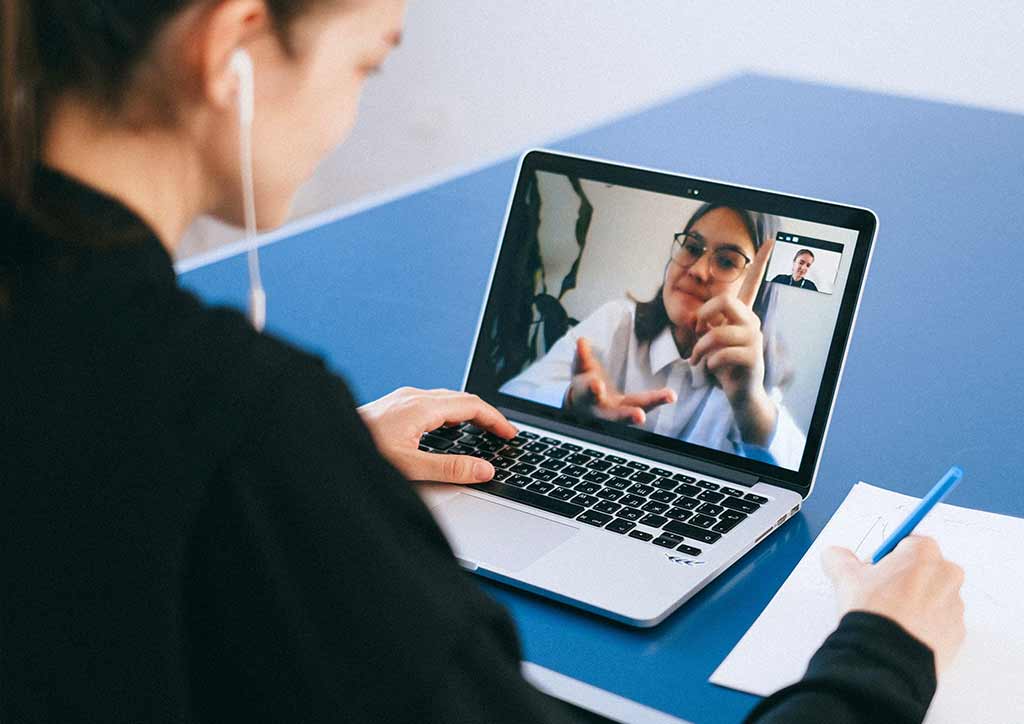Moms and Dads
Crossing Boundaries: The Challenges Of Online Teaching
As parents, we have all heard about how rough online learning is. But have we ever considered the challenges of online teaching? Parent and teacher, Aina Arcilla-Lacson, gives a great perspective to both sides
I stare at the screen and wait for them to go online. In my 20-some years of teaching, I never thought I’d actually be sharing my wisdom to people through a 13-inch screen.
Who would have thought that I’d have to maneuver icons and buttons to facilitate sharing slides and images to drive the point home. Online teaching is as new to me, as it is to the students waiting to log on. I am a student as well as a teacher — at least this year. And taking from one of my college senior students’ thesis title, I realized that online learning has done the inevitable: it has crossed all possible boundaries.
Change of plans
Back-tracking a little, before the pandemic hit, I was tagged to teach students taller than my waistline — college kids. I was excited to share the many years of experience teaching young children with future educators of our country.
We were going to play with toys and make lesson plans. I was going to read good old children’s stories to them, and show them how to teach children to read. Everything was planned out.

But, COVID-19 snaked its way into the world and plans were put to a halt, resulting in empty classrooms and halls. Everyone had to stay home, and everything was to be done at or from home. The classes I excitedly planned, included.
Newsflash: It is not as easy as you think
Learning from home seemed simple enough from a parent’s point of view. I am a parent of a college and a high school student. Online learning seemed simple enough — a computer, a comfortable chair, internet access, study space and they’re off! Right? Wrong.
A teacher’s day, my day, is spent waiting for the students to switch on their cameras to listen and watch me teach. When they’re online, trying to hold the attention of the already-listless teenagers is a gargantuan task. I see it in my own children. Coupled with texting, sending messages, watching other videos on another gadget, multi-tasking had become the way of life for these students. I know that only half of their brains are fully attentive. How can that be easy for BOTH teacher and student?

So for the record, online teaching is not a piece of cake. The absence of the physical proximity has made reaching out to minds, hearts, and bodies a double-difficult task. Nonetheless, we teachers trudge on with the sincerest intentions to teach and learn.
What it takes to be an online educator
Just like traditional face-to-face teaching, a great amount of research, time and output, is invested when we open our mouths to talk. We do not just randomly sift through videos on YouTube or the Khan Academy to post on Canvas or Google Classrooms and hope that our students watch them. We have to be equally discerning regarding content, which we still screen, preview, and analyze.
We look not only for the appropriate videos, but ones that are short enough to be watched, absorbed, and reflected upon on their own initiative. Attention span these days get shorter and shorter. Even if students are not preschoolers.

Aside from working at delivering our message to our students, we teachers think of the parents who paid their hard-earned money for tuition when we make and execute our syllabus.
We have crossed our own personal boundaries as we try to navigate through technology. Instead of being able to leave our homes and set the clear divide between work and rest, we make our homes our workplaces. We remind ourselves to lock our doors to achieve peace and quiet and make sure our own children do not disturb us to be able to teach others.
We put on our smiles for the screen, our authoritative hats when necessary, and do our jobs, despite our own personal issues. We just have to know how to navigate through the maze.
Your kids through their teachers’ eyes
Across the screen I see that our students too are struggling with having to cross their own boundaries. Despite being in the comforts of their homes, I see that they some are disoriented.

What was once their refuge for carefree frolic is now, simultaneously, their workspace. Deadlines breathe heavily from the time they wake to the time they sleep. There are no boundaries between rest and leisure. They have been deprived of the physical company of classmates, teammates and their barkada.
I see how they struggle to be industrious with their submitted work, having researched all night, ironically in the same bedroom they are supposed to rest. I see that they miss laughing with their friends, seeing paper airplanes or crumpled sheets flying across the classroom, rushing to their respective after school activities — whether it be sports, music, co-curricular, etc.
Sadly, all this is transmitted through the screen. The students are constantly tired, as they no longer have the division between rest and work. They take their meals in front of the screen and mealtime chats with family may also have been sacrificed. Students are aching for company that goes beyond the screen. The three-dimensional aspect is no longer satisfactory because nothing can replace physical proximity.

Trying to get the job done no matter what
As teachers, we try to deflect our students’ emotional worries because we are meant to reach their brains, not their hearts. Magically however, we have learned to nurture both heart and minds.
We try our best to mold our lessons to reach their sensibilities and lift their minds together. Extra time is spent to listen closer to them because they are wanting the attention and affirmation from their peers and from another trusted adult. I, personally, have learned to throw my inhibitions aside when I’m onscreen.
As a middle-aged woman, I no longer care if I look silly singing children’s songs and dancing hokey-pokey in front of my college students. I am more animated and engaged. And I think it helps teach the subject matter better and gives some kind of happiness, albeit temporarily, to the tired souls I face three times a week. When my own children chance upon their mom on days I forget to lock the door, they shake their heads but smile and whisper, “respect.” Our role as teachers has also crossed borders.

One unintentional perk of online teaching is the creative ways we teachers have found to listen, care, and give. We keep ourselves abreast with the new research thanks to online connectivity. We watch videos about other teachers creating ways to reach their students through the screens. Schools and other educational institutions are trying to bridge the “online” teaching-and-learning gap, so please don’t be fooled.
Dear parents
When I hear parents say that they should be paying less tuition because learning is “done at home,” I am deeply bruised. They do not realize that the schools have to stay afloat to keep their teachers teaching, even from home. Schools have to think of the economics of education to stay open. If the school folds up, where will their children learn? Who will teach them? The business of teaching cannot be undermined.
Yes, libraries are empty of students but they are full of information that needs to be stored and transmitted to the students at the comforts of their homes. Who will pay for that? Learning should not stop. And someone has to pay for that.

Teachers have to survive too. When all this is over, vaccines are aplenty, and students can walk through the hallways, schools should still be standing, usable and replete with resources — including teachers. Stopping payment will not keep these institutions waiting for their children.
As parents, there is a lot we can do for our kids. If they allow us, we can sit with them to listen to their teachers. We can learn about the latest project they are tasked to complete and for what topic. We can always offer help, even if just to bring a glass of water. Ask to be taught how to use their learning platforms. Children, no matter how old, love to teach too. And they still yearn to be cared for and looked after. Parents ought to cross boundaries too, so I will say it again — don’t be fooled.

Unless herd immunity or vaccine efficacy is achieved, Online Learning and Online Teaching will stay. And I believe it will only get better. Just like a start-up, the first year is always a struggle because it’s a learning process, a trial and error of sorts.
The effort is there, more than we can tangibly see. Despite the ascending chaos work and school bring to the home, families will still prefer the noise at home than the quiet of the ICU. Teachers, no matter how old, will keep trying to learn and improve because that is in our DNA.
We need all the support from parents, along with constructive criticism. We knowingly cross boundaries even if we know what disarray lies in the valley because as human nature has proven time and time again, we will improve as we learn.
Related articles
Pink Today, Sunshine Tomorrow
Coach Mindy Lagdameo Is Helping Postpartum Moms Get Their Bodies Back
10 Tips For Staying Fit For Life





